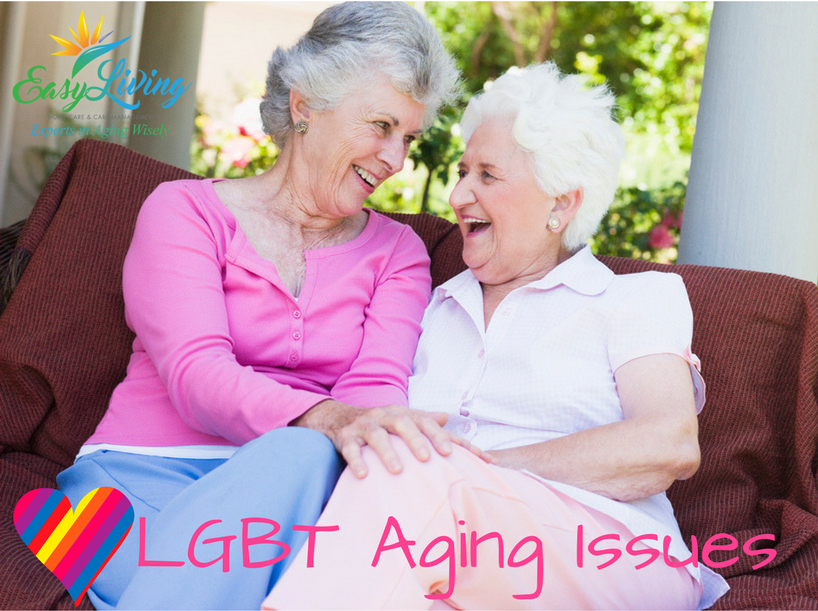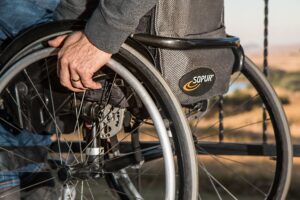Even as LGBT rights improve in our country, there’s an overlooked group facing increasing challenges. Approximately 2.4 million people 65+ in the U.S. identify as lesbian, gay, bisexual or transgender (LGBT). LGBT seniors, sometimes called GenSilent or the Silent Generation, deal with numerous issues as they navigate aging, long-term care, and healthcare needs.
LGBT Seniors: Challenges & Needs
Though this population is quite diverse, these general findings can prove useful in identifying areas of need and solutions.
Isolation
LGBT persons are less likely to be married than cisgender heterosexuals (16% v 50%). Though these numbers are changing, updated marriage laws aren’t likely to have a huge effect on this current generation. As elders they’re more likely to live alone than the overall elderly population. Societal and logistical issues may contribute to greater isolation for LGBT seniors. For example, nearly 60% of surveyed LGBT older adults in one study reported feeling a lack of companionship. And, over 50% reported feeling isolated.
Healthcare Disparities and Access Problems
Lifetime stressors can contribute to economic challenges and certain physical and mental health problems. And, some LGBT seniors may have distrust in the healthcare system or feel unable to share certain concerns. They may face discrimination or lack of understanding as well. Additionally, we know that partner access has been problematic for many LGBT seniors.
Caregiving/Long-Term Care
Various issues face LGBT seniors when it comes to needing long-term care. As mentioned above, caregiver access to information may be limited for unmarried partners. Proper legal documents are essential. And the good news is that many LGBT Baby Boomers have taken proactive steps to protect their relationships/partner access. But even then advocacy may be necessary with providers. Also, LGBT seniors tend to have fewer available family caregivers since they’re less likely to be married or have children. They may also be estranged from other relatives. A strong social network means that friends may step into these roles. Recent studies show more diversity in who is providing informal care (with both gay and heterosexual Baby Boomer men becoming more involved). Providers and systems will need to adapt to this increase in “non-traditional” caregivers.
Unfortunately, LGBT seniors may also face dual discrimination (sexual orientation and age) in health and long-term care settings. This may be compounded by the intersection of gender, race, ethnicity, and disability. Providers’ biases and misunderstandings have kept some older LGBT patients from getting the care they need.
Resources for LGBT Seniors
While some of the systemic issues are beginning to be addressed, elders may still need help on an individual level. We believe professional advocacy benefits most elders, but it’s especially necessary for those facing some of these unique challenges.
Click Here to download our complete Aging Wisely Checklist. Take simple steps to stay in control of your aging journey.
Advocacy
A professional advocate can help you navigate the medical maze, analyze the best health insurance options, find quality care solutions and resolve concerns. Your advocate’s knowledge can help you more easily access programs and services.
Running into uncooperative healthcare professionals or unable to find answers? Your patient advocate knows how to get you solutions. We’re here to help you and your caregivers in both planning and ongoing management. If you’re facing a crisis, contact us at 727-447-5845 for assistance.
Assessment & Personalized Recommendations
Our care managers take the time to understand your unique situation and build recommendations accordingly. We can provide referrals to trusted community professionals who work to understand your needs. We recognize you may have fears about how you’ll be treated by providers or care facilities (or just worry if it will be a good fit). Our advocates can help you analyze your options and find what’s best for you.
Local Support/Personalized Care
EasyLiving can provide services in your home or retirement community, ranging from transportation to meal preparation, light housekeeping and medication management. If the time comes that you need help with personal care (bathing, dressing, hygiene), our caregivers provide highly-skilled, dignified support.
A care manager is someone you can count on to be by your side who knows the local resources and can get you the help you need. From regular check-ins to medical appointments and emergency room support, you won’t be left to deal with everything alone. This also provides peace of mind for your loved ones, especially if they are trying to help from a distance.
Planning, Advocacy, Resources, Support
Our team is here to help. Let’s talk about your concerns.
Additional Resources:
Articles from our advocates:
Focus on LGBT Elders & Planning Considerations for LGBT Elders







